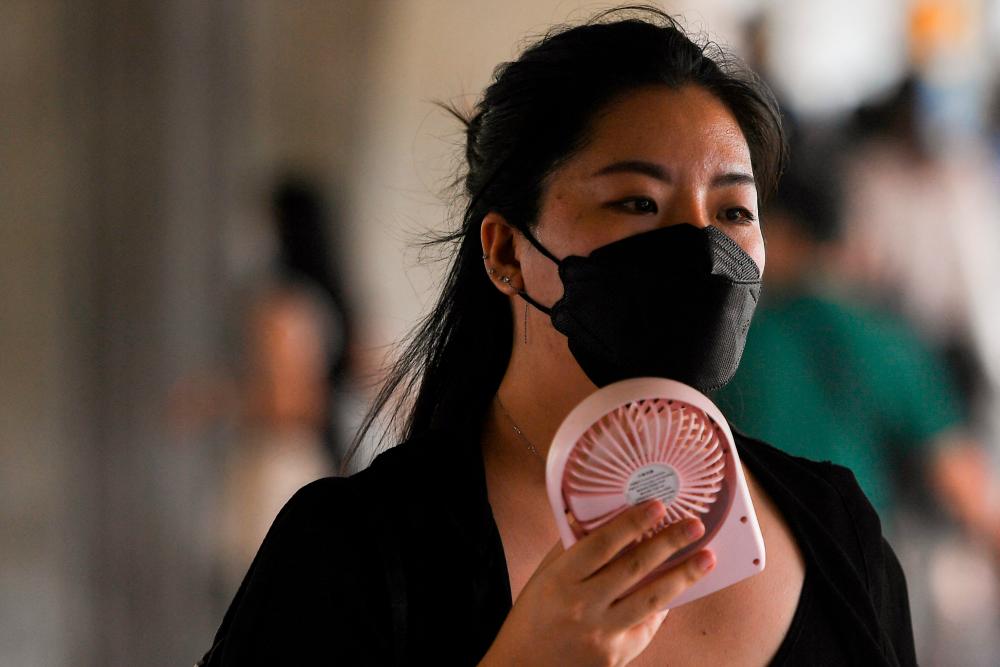News
Thailand Issues Extreme Heat Wave Warning in 5 Locations

On Sunday, Thailand’s Meteorological Department predicted that heat indices would reach dangerous levels in five locations of the country. Scorching hot temperatures that have felt like more than 50°C, combined with humidity, prompted local officials on Friday to warn people not to venture outside during the weekend.
The Meteorological Department had warned about rising temperatures across Thailand. The following are the highest “real feel” apparent regional temperatures forecast on Sunday:
51.2°C in Phetchabun, in the north; 46°C in Kosum Phisai district, Maha Sarakham province, in the northeast; 52.7°C in Bangkok’s Bang Na district, in the centre; 53°C in Sattahip district, Chon Buri province, in the east; and 51.1°C in Phuket, in southern Thailand.
The heat index, also known as the apparent temperature, describes how the temperature feels to the human body when relative humidity and air temperature are combined.
The high temperatures on Sunday led 14 individuals, including voters and poll workers, to faint at Ramkhamhaeng University in the Hua Mak region of Bangkok’s Bang Kapi district, a polling station for advance voting.
Because of the heat, many voters reportedly felt ill and fainted when they arrived at their polling locations for advance voting around midday or in the afternoon, according to Pairat Kasetsin, the Bang Kapi district chief. They were given first-aid care in a neighbouring neighbourhood.
Bangkok Metropolitan Administration dispatched water trucks to the event. Water was splashed into the air to cool it down. More electric fans were installed in the surrounding area.
Three people were reported to have lost consciousness due to the heat at Chan Kasem Rajabhat University, another advance voting polling place in Bangkok.
Soaring Temperatures in Northern Thailand
The northern region of Tak had the highest temperature ever recorded in Thailand since records began, with daytime temperatures reaching 45.4 degrees Celsius. Despite the fact that Thailand has now entered the wet season, the excessive heat shows no signs of abating.
In fact, despite the brief respite provided by summer storms that deluged the kingdom just days after this year’s Songkran festival, average temperatures across many regions remain at an all-time high, putting strain not only on the country’s power grid, but also on its citizens, many of whom have never seen the mercury rise above 45 degrees Celsius in their lifetime.
Prior to this year, Mae Hong Son in Thailand’s upper north held the record for the hottest day ever recorded in Thailand, when the temperature reached 44.6 degrees Celsius in 2016.
Thailand isn’t the only country trying to cope with what scientists have dubbed a “monster heatwave” due to the extent of the heat.
Last month, heat records were being broken on a weekly basis across the Asia-Pacific area, from Pakistan in the west to the Pacific Island of New Caledonia, east of Australia. According to one study, one in every three individuals on the planet is being harmed by the unusual heat, which scientists predict will last for a few more weeks.
Heat Wave Over Southeast Asia
India, for example, was compelled to increase electricity production at numerous facilities that had been operating at reduced capacity due to low demand, as millions of people across the country sought respite from their air conditioners and refrigerators. As the high heat persists over India’s southwestern state of Karnataka, the three main power plants remain on overdrive.
The temperature peaked at 42.9 degrees Celsius in China’s Yunnan province, although over 100 weather monitoring stations across the country reported record high temperatures. While temperatures in Japan remained quite comfortable in the 30-35C range, the average temperature for the month of April soared so dramatically that Tokyo reported the earliest cherry blossoms in 1,200 years.
Closer to home, many major cities saw record temperatures, with Luang Prabang reaching 42.7 degrees Celsius and Sainyabouli reaching 42.9 degrees Celsius.
Schools in Malaysia, Singapore, and the Philippines were closed last week as temperatures stayed above the April normal, and instructors and parents expressed concern for the pupils’ well-being. Only two weeks ago, the heat index in Bangkok reached 54 degrees Celsius, leading the authorities to advise residents to stay indoors during the warmest portion of the day.
Some argue that El Nino is to blame for the region’s excessive temperature increase. However, keep in mind that El Nino episodes are well documented, and temperatures have never climbed to this amount previously.
Global costs of heatwaves
This demonstrates that, while El Nino is to responsible for the “monster heatwave,” other factors are driving temperature swings to be more pronounced than ever before. The most serious of these is unregulated deforestation in the name of development.
Tackling climate change is difficult due to the problem’s transboundary character; hence, unless all parties commit to working together to tackle the problem, the only thing an individual government can do is treat the “symptoms.”
But how long can the government compel school closures, issue work-from-home orders, or limit outdoor activities? Unfortunately, as the election campaign nears its conclusion, neither candidate has prioritized inter-governmental cooperation to address the core causes of global warming.
Instead of promising to address pollution at its source, most candidates, especially those who profess to be among the more progressive, are touting irrational vows to boost the economy, with little consideration for the cost of unfettered development on the economy.
This mindset must change, as the global costs of heatwaves since 1990 have surpassed US$16 trillion (513 trillion baht), nearly the same as the economic harm caused by the Covid-19 pandemic.
This scorching heat should have served as a wake-up call for our leaders, but instead of addressing the issue, they settled for offering temporary discounts on electricity bills, a surefire strategy to garner public support that adds nothing to Thailand’s overall emissions level.
With those in authority blind to the present crisis, it is now time for Thais to recognize the cost of inaction on climate change and express their concerns to their local authorities, for the benefit of future generations.


































